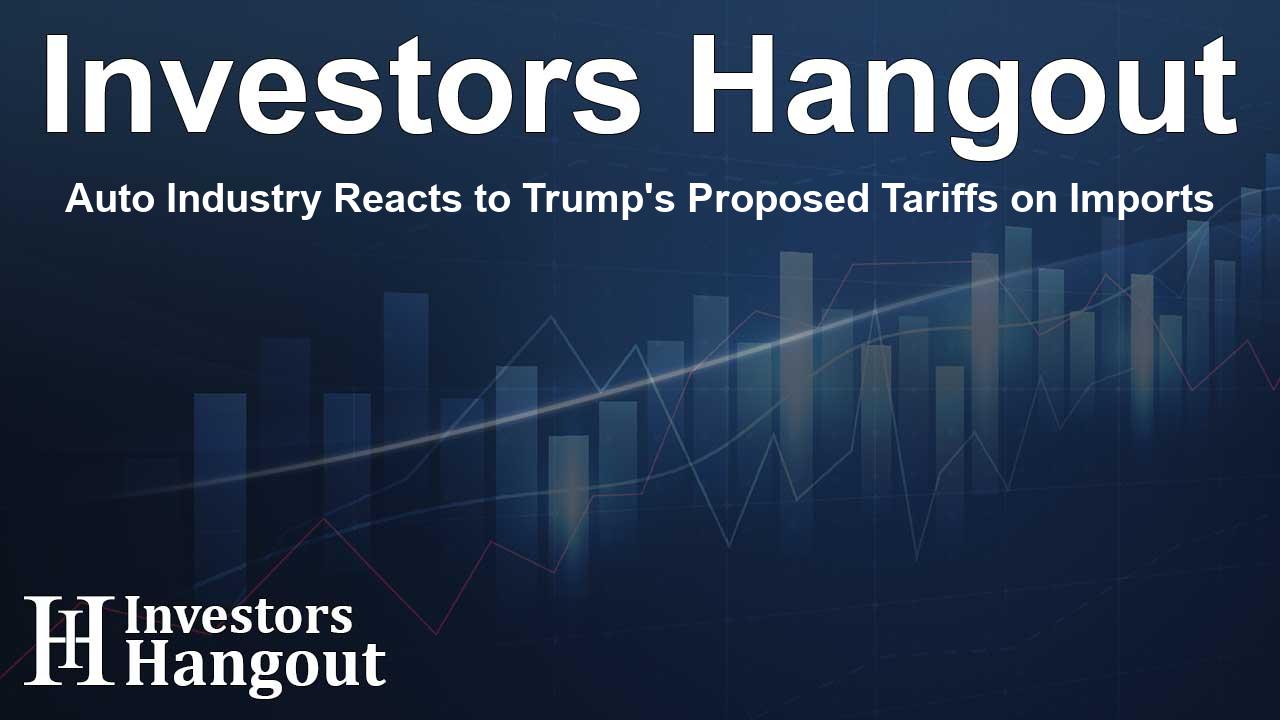Auto Industry Reacts to Trump's Proposed Tariffs on Imports

Impact of Proposed Tariffs on GM and Ford Shares
Recently, the automotive sector faced a turbulent moment when shares of General Motors (NYSE: GM) and Ford (NYSE: F) fell sharply. This decline of 4% for GM and about 2% for Ford was set off by President-elect Donald Trump's indication of potential new tariffs on imports affecting major trade partners like China, Canada, and Mexico. This situation has raised significant concerns in the market, especially as these automotive giants heavily rely on production and imports within these regions.
Understanding Trump's Tariff Proposal
Trump's stance involves implementing a hefty 25% tariff on products entering the United States from Canada and Mexico. His insistence on these tariffs stems from ongoing issues related to drug trafficking and illegal immigration. Such tariffs appear to contradict the framework of the United States-Mexico-Canada Agreement (USMCA), which was designed to facilitate free trade among these nations and was put into practice in 2020.
The Implications for the Automotive Industry
The potential implementation of these tariffs is particularly worrisome for manufacturers like GM and Ford. Both companies have significant manufacturing operations in Mexico and Canada, and they also import several components from China. Consequently, any additional tariff could lead to a spike in production costs, impacting pricing strategies and profit margins. Observers note that these developments could result in higher prices for consumers, ultimately affecting sales.
Broader Economic Consequences
Beyond the automotive sector, Trump's tariff proposals may have widespread ramifications within global markets. For instance, Asian manufacturers often use Mexico as a production hub for products destined for the U.S. consumer market. The tariffs could disrupt these supply chains, leading to increased costs and complications for businesses aiming to remain competitive.
Market Reactions and Currency Fluctuations
The immediate response in financial markets has been notable, with the U.S. dollar gaining strength against the Canadian dollar and the Mexican peso. This fluctuation in currency value reflects trader anxiety about the potential economic consequences resulting from the proposed tariffs. Other global financial markets, particularly in Asia and Europe, have not been sheltered from these concerns, with many stock indices experiencing declines.
The Long-Term Outlook
As Trump approaches his inauguration, economists are voicing their apprehensions over the longer-term impacts of such tariff measures. The consensus is that these actions could lead to inflation spikes, disrupt existing trade relationships, provoke retaliatory measures from affected nations, and necessitate a recalibration of global supply chains. Such shifts in economic policy could echo the protectionist tendencies observed during the Great Depression of the 1930s, an outcome that economists are keen to avoid.
The Stakeholder Perspective
Industry stakeholders are now left to grapple with these uncertainties. Keeping a close watch on these tariff discussions will be crucial for GM and Ford as they strategize about production routes, pricing, and consumer relations moving forward. Their ability to adapt rapidly to changing trade regulations will likely be a defining factor in their success amidst these challenges.
Frequently Asked Questions
How will Trump's proposed tariffs affect GM and Ford shares?
Trump's proposed tariffs have already caused GM and Ford shares to decline due to concerns over increased production costs and economic repercussions.
What are the specific tariffs being proposed?
The proposal includes a 25% tariff on imports from Canada and Mexico, as well as an additional 10% tariff on Chinese imports.
What are the broader implications of these tariffs for the economy?
Economists warn that such tariffs could lead to inflation, disrupt existing trade relations, and trigger retaliatory measures from other nations.
How might these tariffs impact consumers?
If implemented, these tariffs could result in higher vehicle prices for consumers, as automotive companies may pass on increased costs.
What historical context is relevant to these tariff measures?
Many economists are concerned that the proposed tariffs could mirror the protectionist policies of the 1930s, which had devastating effects on global trade.
About Investors Hangout
Investors Hangout is a leading online stock forum for financial discussion and learning, offering a wide range of free tools and resources. It draws in traders of all levels, who exchange market knowledge, investigate trading tactics, and keep an eye on industry developments in real time. Featuring financial articles, stock message boards, quotes, charts, company profiles, and live news updates. Through cooperative learning and a wealth of informational resources, it helps users from novices creating their first portfolios to experts honing their techniques. Join Investors Hangout today: https://investorshangout.com/
Disclaimer: The content of this article is solely for general informational purposes only; it does not represent legal, financial, or investment advice. Investors Hangout does not offer financial advice; the author is not a licensed financial advisor. Consult a qualified advisor before making any financial or investment decisions based on this article. The author's interpretation of publicly available data shapes the opinions presented here; as a result, they should not be taken as advice to purchase, sell, or hold any securities mentioned or any other investments. The author does not guarantee the accuracy, completeness, or timeliness of any material, providing it "as is." Information and market conditions may change; past performance is not indicative of future outcomes. If any of the material offered here is inaccurate, please contact us for corrections.